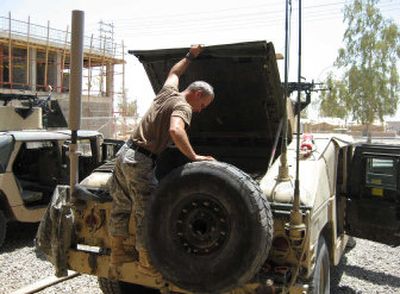Pentagon ending limit on Guard, Reserve duty

WASHINGTON – The Pentagon has abandoned its limit on the time a citizen-soldier can be required to serve on active duty, officials said Thursday, a major change that reflects an Army stretched thin by longer-than-expected combat in Iraq.
The day after President Bush announced his plan for a deeper U.S. military commitment in Iraq, Gen. Peter Pace, chairman of the Joint Chiefs of Staff, told reporters the change in reserve policy would have been made anyway because active-duty troops already were getting too little time between their combat tours.
The Pentagon also announced it is proposing to Congress that the size of the Army be increased by 65,000, to 547,000, and that the Marine Corps, the smallest of the services, grow by 27,000, to 202,000, over the next five years. No cost estimate was provided, but officials said it would be at least several billion dollars.
Until now, the Pentagon’s policy on the Guard or Reserve was that members’ cumulative time on active duty for the Iraq or Afghan wars could not exceed 24 months. That cumulative limit is now lifted; the remaining limit is on the length of any single mobilization, which may not exceed 24 consecutive months, Pace said.
In other words, a citizen-soldier could be mobilized for a 24-month stretch in Iraq or Afghanistan, then demobilized and allowed to return to civilian life, only to be mobilized a second time for as much as an additional 24 months. In practice, Pace said, the Pentagon intends to limit all future mobilizations to 12 months.
Members of the Guard combat brigades that have served in Iraq in recent years spent 18 months on active duty – about six months in pre-deployment training in the United States, followed by about 12 months in Iraq.
Under the old policy, they could not be sent back to Iraq because their cumulative time on active duty would exceed 24 months. Now that cumulative limit has been lifted, giving the Pentagon more flexibility.
The new approach, Pace said, is to squeeze the training, deployment and demobilization into a maximum of 12 months. He called that a “significant planning factor” for Guard and Reserve members and their families.
David Chu, the Pentagon’s chief of personnel, said in an interview that he thinks Guard and Reserve members will be cheered by the decision to limit future mobilizations to 12 months.
The fact that some with previous Iraq experience will end up spending more than 24 months on active duty is “no big deal,” Chu said, because it has been “implicitly understood” by most that they eventually would go beyond 24 months.
A senior U.S. military official who briefed reporters Thursday on Iraq-related developments said that by next January, the Pentagon “probably will be calling again” on National Guard combat brigades that previously served yearlong tours in Iraq. Under Pentagon ground rules, the official could not be further identified.